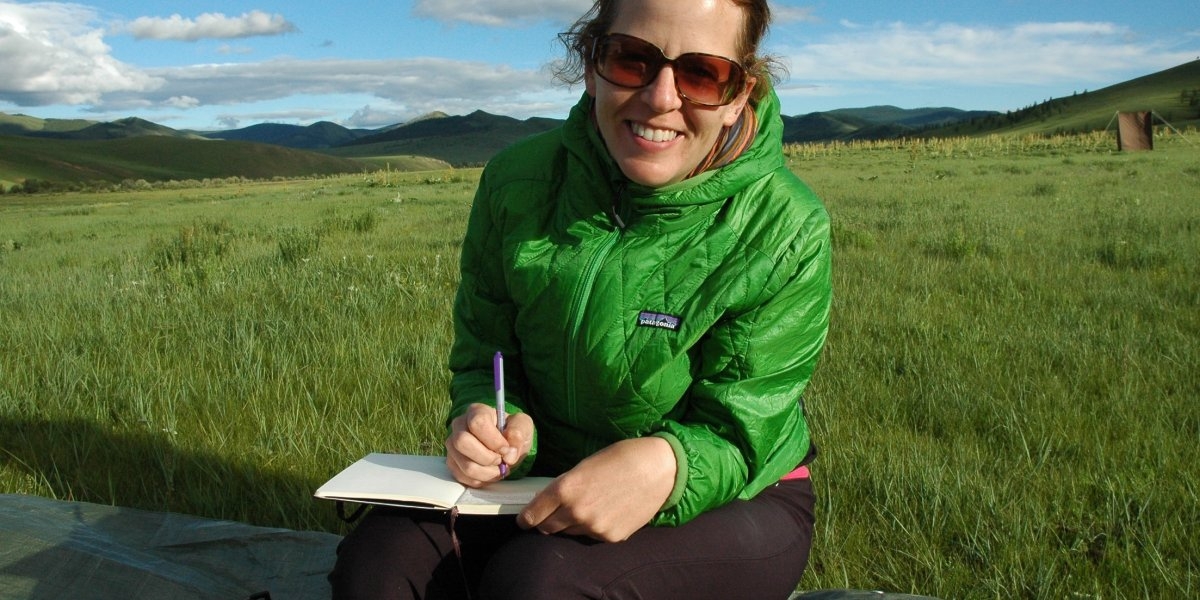Photo: Private
I got away with something that wasn’t fair, even though I enjoyed it
I started a journey in flying less in 2012, when I stopped flying within Europe. Before that I was a frequent flyer.
Kimberly Nicholas
This text is a part of the project FLYWELL.Read more of our stories here
My peak flying year was 2010, when I took 15 round trip flights. At that time, I saw that number as a point of pride, but now I feel more … not exactly shame, but more like I got away with something that wasn’t fair, even though I enjoyed it.
I grew up in a frequent flyer family. My parents traveled for work and took me and my sister on family holidays to far-flung destinations: Tahiti, Thailand, China, Australia, Paris, London. My mom recently wrote me that she bought us cheap clothes and wanted to give us experiences, not things. I loved these trips, both the time with my family and the chance to see new landscapes and cultures, to taste new foods. Did these trips fundamentally shape my well-being? I’m not sure, but they definitely had status… I certainly thought I had cooler vacations than my friends who didn’t travel far during holidays. I’ve talked with my friend J. about how we grew up being taught that the world is our oyster… it’s a challenge to think differently about travel, how to still enjoy and explore the world and meet new people, but in a way that is respectful, not acquisitive.
In my peak flying days in my 20s and early 30s, I felt like I was ticking destinations off a list. The default with any free time or money was to take a cheap flight somewhere new. I love the sense of adventure, but on a solo hiking trip in Mongolia I started to feel lonely and question why I felt the need to travel so much and so fast. Wherever I went, there I still was… no flight could get me out of my own head. I wondered if that was what I was really seeking. But it was always the same me who was seeing and experiencing whatever new place I traveled to.
In Mongolia. Photo: Private
It has felt good for me personally to reduce my own flying over 90%, to live more in line with my values. Still, I know with taking at least one international flight per year, from Sweden back to California and western Canada to see my family and my husband’s family, I am still using more than my fair share of the carbon budget for flying. Last summer my husband and I bought a sailboat, and have been learning to sail. Our dream has been to sail across the Atlantic someday, so we can see our families without flying. I’m really enjoying sailing. But having taken this step makes trans-Atlantic travel without flying seem further away, not closer. We are really slow sailors, and the world is really big!
I have researched, written, and given talks about flying less for almost a decade now. So I feel some responsibility to lead by example with my own behavior. I don’t feel that I have to be perfect, but I know research shows the public believes scientists with a low carbon footprint are more credible, and they are more willing to make behavior changes that scientists themselves have made. However, recently I’ve been wondering if I can maintain this constraint forever. It does take time and energy to travel more slowly, and I wonder how long I will have the health and time to be able to enjoy slow travel.
I feel really frustrated with how many of my close friends are still frequent flyers. Even/especially those who know and care the most about climate. On bad days, it makes me feel like we will never reduce emissions fast enough to avoid catastrophic climate change, when those who have the most aren’t willing to be the change themselves. Some friends don’t want to talk to me about their flying. I think they fear either my judgment (which I work hard to try to avoid), or perhaps more likely, having to face their own cognitive dissonance. One friend recently told me that reading Kim Stanley Robinson’s Ministry for the Future made him realize what it would take for him to fly less: for eco-terrorists to blow up commercial planes, as happens in that book. He feels he gets so much value out of flying, only if the physical safety of his family were threatened would he want to change his behavior. It feels depressing to me to think that some people will not make positive changes until or unless they’re forced to; that is a world with a lot of excess avoidable suffering.
My mom died unexpectedly in February 2024. I flew home from Sweden to California shortly thereafter and stayed with my dad for five weeks, planning her memorial and helping take care of a huge amount of “sadmin”. There are so many tasks you don’t imagine until someone you love dies—cancelling their dentist, doctor, and hair appointments, credit cards, and magazines; finding and booking their burial plot; picking up their ashes from the funeral home. I was grateful I could take a flight to be home quickly. I feel I want to go home more often now that my dad is living alone, to spend time with him and to help make sure he’s doing okay. I feel like a year is too long to let go by between visits home, when I don’t know how many years my dad has left. I know the climate doesn’t care about my rationale for burning more carbon, but right now these flights feel essential for my wellbeing.
